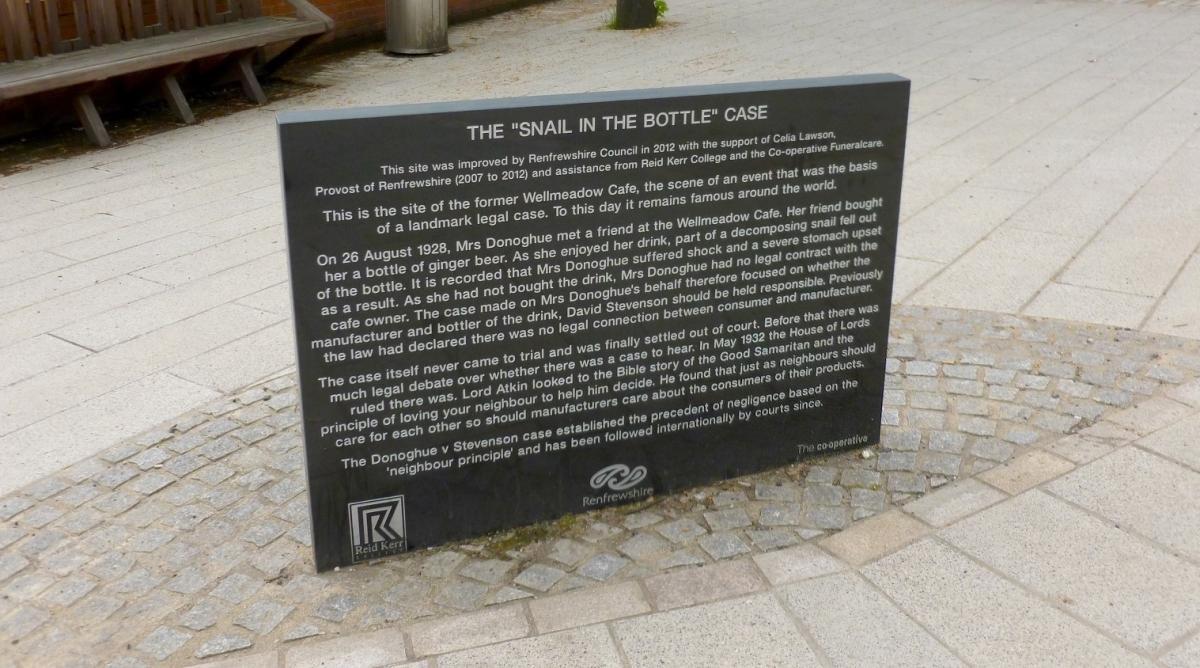
Disclaimer: Any views expressed by individuals and organisations are their own and do not in any way represent the views of The Heritage Portal. If you find any mistakes or historical inaccuracies, please contact the editor.
Escargot, especially smothered in garlic and butter sauce, are considered by many to be a source of gastronomic delight.
For Ms May Donoghue her encounter with a snail while dining at the Wellmeadow Café in Paisley was far from delightful: it was in fact shocking!
The café is in the foreground on the left
Ms Donoghue had ordered a “Scotsmans Ginger Float”. The owner of the cafe, Francis Minghella served Ms Donoghue: she poured some “Stevensons Ginger Beer” (contained in a brown opaque glass bottle) over a scoop of ice-cream. After Ms Donoghue had consumed a portion of her dish, her companion decanted the remainder of the bottle into a glass, at which point a decomposed snail floated out as part of the contents!
As a result of the nauseating sight of the snail in such circumstances, and in consequence of the impurities in the ginger-beer which she had already consumed, Ms Donoghue suffered from shock and severe gastro-enteritis which even necessitated a visit to her hospital!
Since Mr Stevenson, a manufactuer of aerated water products, had not sold the ginger beer to Ms Donoghue there was no contractual nexus between them. Instead she was forced to frame her claim as a delictual action (or what some jurisdictions refer to as a tort). She accordingly alleged that:
- the ginger-beer was manufactured by the respondent to be sold as a drink to the public (including Ms Donoghue);
- it was bottled by the respondent and labelled by him with a label bearing his name;
- the bottles were thereafter sealed with a metal cap by the respondent;
- it was the duty of the respondent to provide a system of working his business which would not allow snails to get into his ginger-beer bottles;
- it was also his duty to provide an efficient system of inspection of the bottles before the ginger-beer was filled into them,
- he had failed in both those duties and had so caused the accident.
Even though the claim was settled before a full trial was necessary (and so we have no further interrogation by the Court on the operations of the manufacturer, including what steps he usually employed to ensure that snails were not a regular component of his ginger beer), the United Kingdom Supreme Court was called on to issue a ruling on whether Ms Donoghue had a legal basis “in principle” on which to sue Stevenson.
At the outset of his judgment Lord Atkin expressed the view:
I do not think a more important problem has occupied your Lordships in your judicial capacity: important both because of its bearing on public health and because of the practical test which it applies to the system under which it arises.
The crisp question to be answered was whether in the particular circumstances the manufacturer owed the claimant (Ms Donoghue) any duty to take care.
Lord Atkin famously relied on the biblical notion that one should love your neighbour as you love yourself when he framed the applicable legal principle in the following terms:
The liability for negligence... is no doubt based upon a general public sentiment of moral wrongdoing for which the offender must pay. But acts or omissions which any moral code would censure cannot in a practical world be treated so as to give a right to every person injured by them to demand relief. In this way rules of law arise which limit the range of complainants and the extent of their remedy.
The rule that you are to love your neighbour becomes in law, you must not injure your neighbour; and the lawyer’s question, 'Who is my neighbour?' receives a restricted reply. You must take reasonable care to avoid acts or omissions which you can reasonably foresee would be likely to injure your neighbour. Who, then, in law is my neighbour? The answer seems to be - persons who are so closely and directly affected by my act that I ought reasonably to have them in contemplation as being so affected when I am directing my mind to the acts or omissions which are called in question.
Apart from all the other authorities he referred to in the course of his judgment, Lord Atkin also took comfort from the fact that the law in the United States (as evinced by the decision of Cardozo J. in MacPherson v. Buick Motor Co. in the New York Court of Appeals (217 N. Y. 382.) would accord with his own views.
Lord Atkins accordingly concluded his judgment by stating:
My Lords, if your Lordships accept the view that this pleading discloses a relevant cause of action you will be affirming the proposition that by Scots and English law alike a manufacturer of products, which he sells in such a form as to show that he intends them to reach the ultimate consumer in the form in which they left him with no reasonable possibility of intermediate examination, and with the knowledge that the absence of reasonable care in the preparation or putting up of the products will result in an injury to the consumer’s life or property, owes a duty to the consumer to take that reasonable care.
It is a proposition which I venture to say no one in Scotland or England who was not a lawyer would for one moment doubt. It will be an advantage to make it clear that the law in this matter, as in most others, is in accordance with sound common sense. (Author’s emphasis)
The principle of law stated in the “snail in a bottle” case has been widely accepted around the world, including in South Africa and is the fundamental principle upon which thousands of “product liability” claims have been founded.
Early in my own career I was involved in a case where a Free State farmer sued the the manufacturer of a so-called “anti-freeze” additive which he alleged had failed to work and which caused his earthmoving vehicle’s engine to seize when he attempted to start the vehicle on a cold winter morning, causing severe damage to the engine.
The firm Deneys Reitz at which I was doing my “articles” represented the insurer of the manufacturer of the anti-freeze additive. After two weeks of intensive pre-trial preparation and very interesting discussions with a number of potential expert witnesses from the science faculty at the University of Witwatersrand, we (meaning our counsel and my principal Michael Hart) recommended to the manufacturer, inter alia on the basis of Donoghue v Stevenson, that they should settle the claim of the farmer, which they did.
More recently we can find strains of the Donoghue v Stevenson rule in the right granted to consumers in terms of section 56(2) of the Consumer Protection Act 2008 which provides that every consumer has a right to receive goods that:
- are reasonably suitable for the purposes for which they are generally intended;
- are of good quality, in good working order and free of any defects;
- will be useable and durable for a reasonable period of time, having regard to the use to which they would normally be put and to all the surrounding circumstances of their supply; and
- comply with any applicable standards set under the Standards Act, 1993 (ActNo. 29 of 1993), or any other public regulation.
All of which reminds us of the quip: "What is worse than finding a worm in your salad? Finding half a worm!"
This article forms part of a series on cases that shaped South African law. Click here to view other articles and here to pre-order the book.
Graeme Fraser (BA LLB LLM HDip Tax) and Veldra Fraser are corporate and commercial law consultants who operate under the Company Law Today brand (www.companylawtoday.co.za). We have a passionate interest in legal writing and in particular the collection of cases from South Africa and other jurisdictions. We have co-authored, self-published and marketed over 23 books since 2010 (and there are more in the pipeline. Graeme also wrote "Summit Vision" an account of the lessons he learned creating co-ordinating and completing the Millennium Big 5 Challenge in the year 2000 : Dusi Canoe Marathon, Midmar Mile Swim, Cape Argus Cycle, Comrades and an ascent to Uhuru Peak on Mt Kilimanjaro.
Comments will load below. If for any reason none appear click here for some troubleshooting tips. If you would like to post a comment and need instructions click here.

